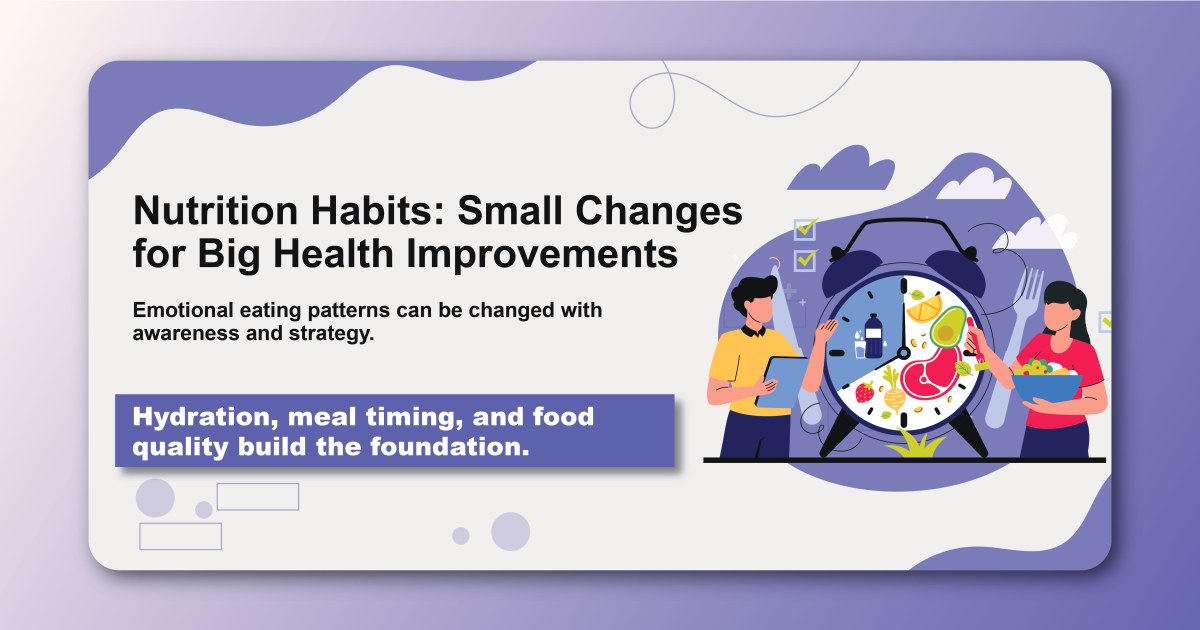When it comes to nutrition, most people think they need to completely overhaul their diet, follow strict meal plans, or eliminate entire food groups to see meaningful results. This all-or-nothing approach often leads to frustration, unsustainable restrictions, and eventual abandonment of healthy eating efforts. The truth is, small, consistent changes to your nutrition habits can create profound improvements in your health, energy, and overall well-being.
The power of nutrition habits lies not in dramatic transformations but in the compound effect of making slightly better choices consistently over time. When you focus on building sustainable eating habits rather than following rigid diets, you create lasting changes that become automatic parts of your daily routine.
Research consistently shows that people who maintain healthy eating patterns long-term do so through habits, not willpower. They've developed automatic behaviors around food that support their health goals without requiring constant decision-making or restriction. These habits become so integrated into their lives that eating well feels natural and effortless.
The key to successful nutrition habits is starting with small, manageable changes that you can maintain consistently. As these micro-habits become automatic, you can gradually build on them, creating a personalized approach to healthy eating that fits your lifestyle, preferences, and goals.
The Science of Nutrition Habits
How Nutrition Affects Your Body
Energy and Metabolism
- Consistent meal timing helps regulate your body's natural energy cycles
- Balanced nutrition provides steady fuel for physical and mental performance
- Proper nutrition supports metabolic efficiency and healthy weight management
- Regular eating patterns help maintain stable blood sugar levels
Brain Function and Mood
- Nutrition directly impacts neurotransmitter production, affecting mood and cognitive function
- Stable blood sugar prevents energy crashes and mood swings
- Certain nutrients support brain health and protect against cognitive decline
- Proper hydration is essential for mental clarity and focus
Physical Health
- Nutrition provides the building blocks for cellular repair and regeneration
- Healthy eating patterns reduce inflammation and support immune function
- Proper nutrition supports bone health, muscle maintenance, and cardiovascular health
- Consistent healthy eating habits can prevent or manage chronic diseases
The Psychology of Eating Habits
Automatic Behaviors
- Most eating decisions are made unconsciously based on environmental cues and established habits
- Changing your food environment is more effective than relying on willpower
- Consistent eating patterns create neural pathways that make healthy choices automatic
- Habit formation around food typically takes 2-8 weeks of consistent practice
Emotional Eating
- Many people use food to manage emotions rather than hunger
- Stress, anxiety, and other emotions can trigger eating behaviors
- Building awareness of emotional eating patterns is the first step to change
- Developing alternative coping strategies reduces reliance on food for emotional regulation
Social and Environmental Factors
- Your eating habits are heavily influenced by your social environment
- Food availability and accessibility significantly impact eating behaviors
- Cultural and family patterns shape your relationship with food
- Environmental design can support or hinder healthy eating habits
Foundation Nutrition Habits
Hydration Habits
Consistent Water Intake
- Start your day with a glass of water to kickstart hydration
- Drink water before each meal to support digestion and satiety
- Keep a water bottle visible and accessible throughout the day
- Set reminders to drink water regularly, especially during busy periods
Hydration Strategies
- Add natural flavors to water with lemon, cucumber, or mint
- Track your water intake to build awareness of hydration patterns
- Use the color of your urine as a simple hydration assessment
- Increase water intake during exercise, hot weather, or illness
Benefits of Proper Hydration
- Improved energy levels and mental clarity
- Better digestion and nutrient absorption
- Enhanced physical performance and recovery
- Healthier skin and improved detoxification
Meal Timing and Structure
Regular Meal Schedule
- Eat at consistent times each day to regulate your body's hunger and energy cycles
- Include breakfast to jumpstart your metabolism and provide morning energy
- Space meals 3-4 hours apart to maintain stable blood sugar levels
- Listen to your body's hunger and fullness cues
Meal Composition
- Include protein in every meal to support satiety and muscle maintenance
- Fill half your plate with vegetables for nutrients and fiber
- Choose whole grains over refined carbohydrates for sustained energy
- Include healthy fats for hormone production and nutrient absorption
Mindful Eating Practices
- Eat without distractions like TV, phones, or computers
- Chew thoroughly and eat slowly to improve digestion and satisfaction
- Pay attention to hunger and fullness signals
- Practice gratitude for your food and the nourishment it provides
Food Quality Improvements
Whole Foods Focus
- Choose whole, minimally processed foods over packaged alternatives
- Shop the perimeter of the grocery store where fresh foods are typically located
- Read ingredient labels and choose products with fewer, recognizable ingredients
- Prioritize seasonal, local produce when possible
Nutrient Density
- Choose foods that provide maximum nutrition per calorie
- Include a variety of colorful fruits and vegetables for diverse nutrients
- Select lean proteins from various sources (plant and animal)
- Choose healthy fats from sources like nuts, seeds, avocados, and olive oil
Gradual Substitutions
- Replace refined grains with whole grain alternatives
- Swap sugary drinks for water, herbal tea, or naturally flavored water
- Choose baked, grilled, or steamed foods over fried options
- Gradually reduce added sugars and processed foods
Building Sustainable Nutrition Habits
Starting Small and Building Gradually
The 1% Rule
- Make tiny improvements to your eating habits each day
- Focus on one small change at a time rather than multiple changes simultaneously
- Celebrate small wins to build momentum and motivation
- Allow new habits to become automatic before adding new ones
Examples of Small Changes
- Add one extra serving of vegetables to your daily meals
- Replace one sugary drink with water
- Include a piece of fruit as a snack instead of processed food
- Take a 5-minute walk after meals
Progressive Building
- Week 1-2: Focus on hydration and meal timing
- Week 3-4: Add one extra serving of vegetables daily
- Week 5-6: Improve the quality of your snacks
- Week 7-8: Focus on portion awareness and mindful eating
Environmental Design for Healthy Eating
Kitchen Organization
- Keep healthy foods visible and easily accessible
- Store less healthy foods in less convenient locations
- Prep healthy snacks in advance for easy access
- Use smaller plates and bowls to naturally reduce portion sizes
Food Preparation
- Meal prep on weekends to make healthy choices easier during busy weekdays
- Keep healthy ingredients on hand for quick, nutritious meals
- Batch cook grains, proteins, and vegetables for easy meal assembly
- Have backup healthy meals for busy or stressful days
Shopping Strategies
- Shop with a list to avoid impulsive, less healthy purchases
- Shop when you're not hungry to make better food choices
- Choose specific days for grocery shopping to maintain consistency
- Explore farmers markets for fresh, seasonal produce
Habit Stacking for Nutrition
Linking New Habits to Existing Ones
- "After I wake up, I will drink a glass of water"
- "After I sit down for lunch, I will eat my vegetables first"
- "After I finish dinner, I will prepare tomorrow's healthy snacks"
- "After I grocery shop, I will wash and prep my vegetables"
Creating Meal Rituals
- Develop consistent morning routines that include healthy breakfast
- Create evening rituals around meal preparation and planning
- Establish weekend routines for meal prep and planning
- Build family traditions around healthy eating and cooking
Overcoming Common Nutrition Obstacles
"I Don't Have Time"
Time-Saving Strategies
- Focus on simple, quick preparations rather than complex recipes
- Use frozen vegetables and pre-cut produce when fresh isn't available
- Batch cook on weekends to save time during busy weekdays
- Keep healthy convenience foods on hand for emergencies
Efficient Meal Planning
- Plan meals around your schedule, not ideal scenarios
- Prepare components that can be mixed and matched throughout the week
- Use slow cookers or instant pots for hands-off cooking
- Focus on meals that can be prepared in 20 minutes or less
"Healthy Food is Expensive"
Budget-Friendly Strategies
- Buy seasonal produce when it's most affordable
- Purchase frozen fruits and vegetables for year-round nutrition
- Buy in bulk for non-perishable items like grains, beans, and nuts
- Focus on simple, whole foods rather than expensive health products
Cost-Effective Nutrition
- Beans and lentils provide inexpensive, high-quality protein
- Eggs are one of the most affordable complete proteins
- Seasonal fruits and vegetables offer the best nutritional value for money
- Cooking at home is almost always less expensive than eating out
"I Don't Know How to Cook"
Skill Building
- Start with simple recipes that require minimal cooking skills
- Focus on learning one new cooking technique each week
- Use cooking apps or YouTube videos for step-by-step guidance
- Practice basic techniques like roasting, steaming, and sautéing
Simple Preparation Methods
- Raw foods like salads, fruits, and vegetables require no cooking
- Steaming vegetables preserves nutrients and requires minimal skill
- Baking proteins and vegetables is simple and hands-off
- Slow cooking allows for easy, flavorful meals with minimal effort
"I Have Cravings and Emotional Eating"
Understanding Cravings
- Cravings often signal nutrient deficiencies or blood sugar imbalances
- Stress, lack of sleep, and dehydration can trigger food cravings
- Emotional eating patterns often develop as coping mechanisms
- Identifying triggers helps develop alternative responses
Healthy Coping Strategies
- Practice mindful eating to distinguish between hunger and emotional needs
- Develop a toolkit of non-food activities for emotional regulation
- Ensure adequate nutrition to prevent cravings driven by deficiencies
- Address stress and sleep issues that may contribute to emotional eating
Advanced Nutrition Strategies
Personalized Nutrition
Individual Needs Assessment
- Consider your age, activity level, health conditions, and goals
- Pay attention to how different foods affect your energy and mood
- Consider working with a registered dietitian for personalized guidance
- Track your food intake and symptoms to identify patterns
Biomarker Tracking
- Regular blood tests can reveal nutrient deficiencies or health markers
- Monitor energy levels, sleep quality, and mood in relation to diet
- Track digestive health and food sensitivities
- Adjust your nutrition habits based on how your body responds
Nutrition for Specific Goals
Energy and Performance
- Time carbohydrate intake around physical activity
- Include protein in post-workout meals for recovery
- Maintain consistent meal timing to support energy levels
- Stay hydrated before, during, and after exercise
Weight Management
- Focus on nutrient-dense, satisfying foods
- Practice portion awareness without restrictive measuring
- Include protein and fiber in meals to promote satiety
- Eat slowly and mindfully to recognize fullness cues
Digestive Health
- Include fermented foods to support gut bacteria
- Increase fiber intake gradually to prevent digestive discomfort
- Stay hydrated to support healthy digestion
- Pay attention to foods that may trigger digestive issues
Long-Term Sustainability
Flexibility and Balance
- Follow the 80/20 rule: aim for healthy choices 80% of the time
- Allow for occasional treats without guilt or restriction
- Adapt your nutrition habits to different life circumstances
- Focus on overall patterns rather than perfect daily execution
Social and Cultural Considerations
- Find ways to maintain healthy habits while participating in social activities
- Adapt traditional or cultural foods to be healthier versions
- Communicate your health goals to supportive friends and family
- Balance personal health goals with social enjoyment
Creating Your Personal Nutrition Plan
Assessment and Goal Setting
Current Habit Analysis
- Track your current eating patterns for one week without judgment
- Identify existing habits that support or hinder your health goals
- Notice patterns in timing, food choices, and eating behaviors
- Recognize emotional or environmental triggers for eating
Goal Setting
- Set specific, measurable, achievable nutrition goals
- Focus on behavior changes rather than just outcome goals
- Break larger goals into smaller, manageable steps
- Regularly review and adjust goals based on progress and changes
Implementation Strategy
Phase 1: Foundation Building (Weeks 1-4)
- Establish consistent meal timing and hydration habits
- Focus on adding one healthy food or habit per week
- Create a supportive food environment
- Begin tracking your habits and progress
Phase 2: Quality Improvement (Weeks 5-8)
- Gradually improve the quality of your food choices
- Increase vegetable and fruit intake
- Reduce processed foods and added sugars
- Develop cooking skills and meal preparation routines
Phase 3: Optimization (Weeks 9-12)
- Fine-tune your nutrition habits based on how you feel
- Address any remaining obstacles or challenges
- Develop strategies for maintaining habits during busy or stressful periods
- Build flexibility into your approach for long-term sustainability
Tracking and Adjustment
Progress Monitoring
- Track habit consistency rather than just food intake
- Monitor energy levels, mood, and physical changes
- Notice improvements in sleep, digestion, and overall well-being
- Celebrate non-scale victories and positive changes
Continuous Improvement
- Regularly assess which habits are working and which need adjustment
- Be willing to modify your approach based on changing circumstances
- Stay curious about new foods and preparation methods
- Seek support from healthcare providers or nutrition professionals when needed
Building healthy nutrition habits is not about following the perfect diet—it's about creating sustainable patterns of eating that support your health, energy, and overall well-being. The most successful approach is to start small, be consistent, and gradually build on your successes over time.
Remember that nutrition is highly individual, and what works for others may not work for you. Focus on developing habits that fit your lifestyle, preferences, and goals. The key is to make changes that you can maintain long-term, creating a positive relationship with food that supports your health for years to come.
Your nutrition habits are investments in your future self. Every healthy choice you make today contributes to better energy, improved mood, and enhanced health tomorrow. Start where you are, use what you have, and take one small step toward better nutrition. Your body—and your future self—will thank you for the investment.
Ready to transform your health through sustainable nutrition habits? Track your eating patterns and build lasting nutritional wellness with Habityzer and discover how small, consistent changes can lead to significant improvements in your health and energy.


